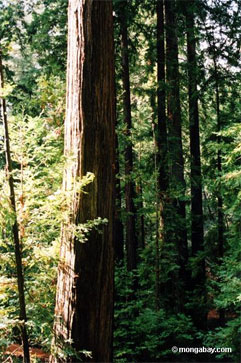Global warming threatens California’s native plants
Global warming threatens California’s native plants
mongabay.com
June 24, 2008
|
|
Two-thirds of California’s native plants could suffer an 80 percent or more reduction in geographic range by the end of the century due to changing climate warns a study appearing tomorrow in the open-access journal PLoS ONE.
The research, which considers the range of endemic plant species under various climate scenarios, shows that higher temperatures and shifts in precipitation could have a significant impact on the state’s diversity of flora, including coast redwoods and California oaks.
 |
“Our study projects that climate change will profoundly impact the future of the native flora in California,” said David Ackerly, a UC Berkeley biology professor and co-author of the paper. “The magnitude and speed of climate change today is greater than during past glacial periods, and plants are in danger of getting killed off before they can adjust their distributions to keep pace.”
“Across the flora, there will be winners and losers,” said lead author Scott Loarie, a Ph.D. candidate at Duke University’s Nicholas School for the Environment. “In nearly every scenario we explored, biodiversity suffers – especially if the flora can’t disperse fast enough to keep pace with climate change.”
Under the most dire models — where warming is so severe that plants are unable to migrate fast enough to suitable habitats — plant diversity will decrease across the state by as much as 25 percent.
The researchers say the worst outcomes can be mitigated by protecting “climate-change refugia” — places where large numbers of climate-vulnerable plants are projected to persist — from development.
“Planning for refugees will become a new but important concept for natural reserves to think about,” said UC Berkeley biology professor Brent Mishler.